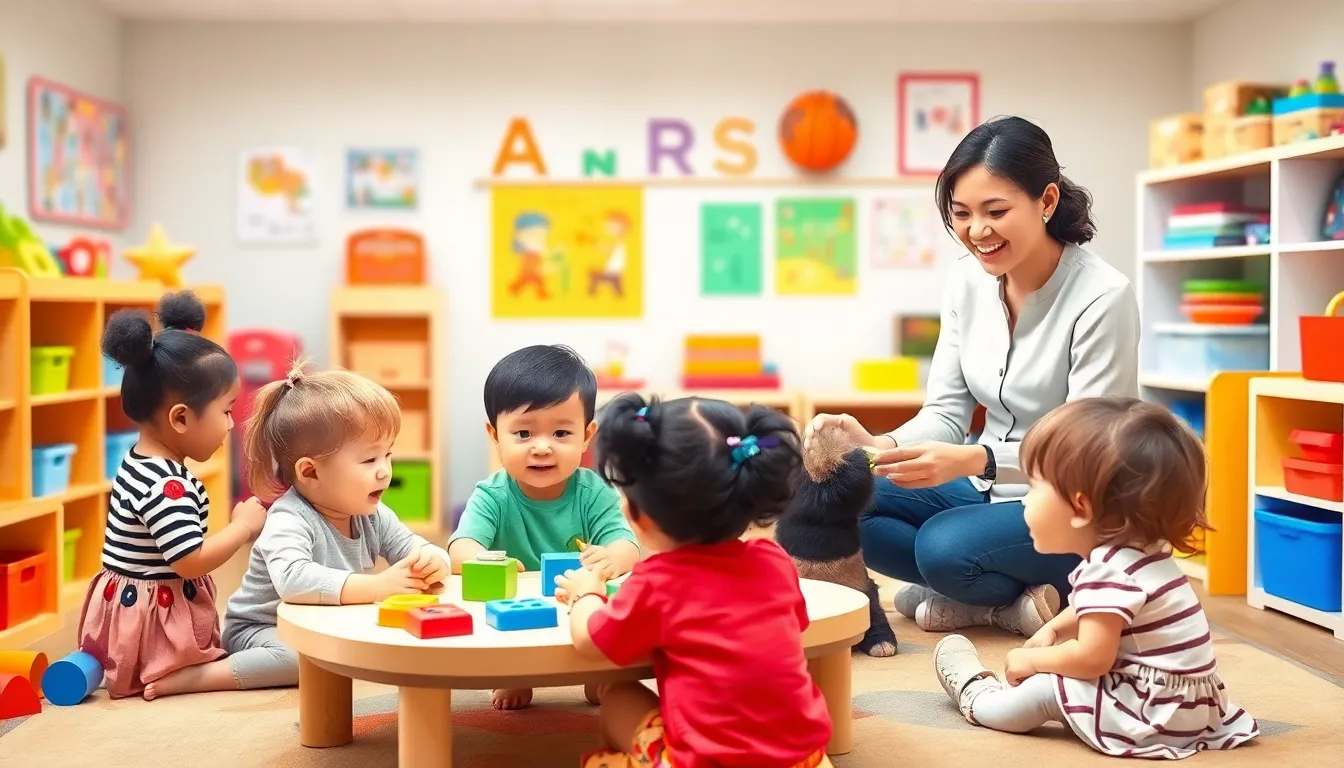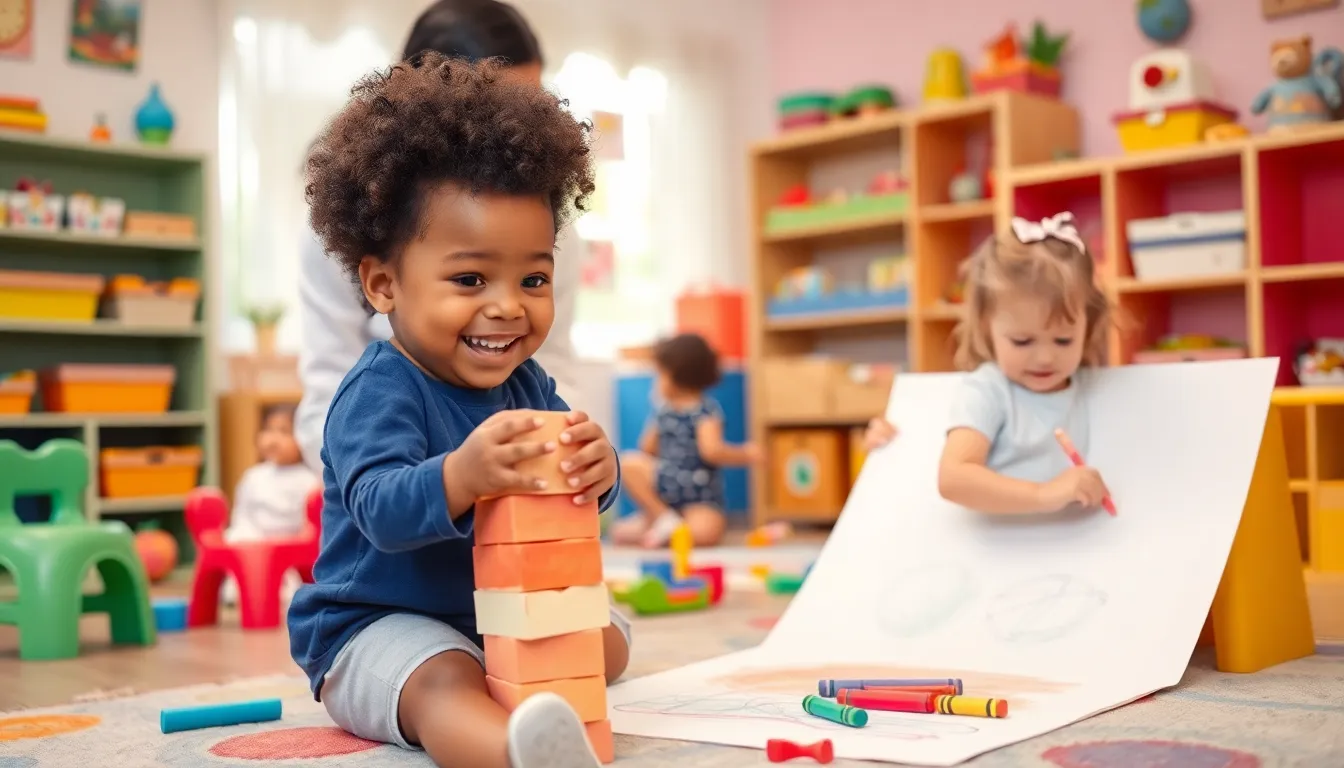Finding the perfect toddler nursery can feel like searching for a unicorn in a haystack. With endless options and opinions, it’s easy to get overwhelmed. But fear not! This journey can be as joyful as a toddler’s giggle—if you know what to look for.
Table of Contents
ToggleOverview of Toddler Nurseries
Toddler nurseries provide essential early childhood education, fostering a nurturing environment for children between the ages of one and three. These facilities aim to promote developmental milestones through structured activities and social interactions. Each nursery features age-appropriate learning materials, safe play areas, and routines designed to build confidence.
Parents often seek nurseries that align with their educational philosophies and values. Research shows that high-quality toddler nurseries can enhance language skills, cognitive development, and social abilities, laying a strong foundation for future learning. Effective nurseries emphasize exploring creativity, including art projects and sensory play, which engage children’s imagination.
Qualified staff members typically lead activities, ensuring that each child’s individual needs are met. Adequate adult-to-child ratios, generally one adult for every four toddlers, create an environment where personalized attention thrives. Moreover, nurseries prioritize safety, maintaining clean facilities and implementing strict health guidelines to protect children.
Exploring the variety of available programs is essential for parents. Many nurseries offer part-time or full-time care options, with flexible hours accommodating varying schedules. Some facilities incorporate outdoor activities that promote physical health and well-being, encouraging toddlers to explore nature.
Established communication between parents and nursery staff enhances a child’s experience. Regular updates regarding development and daily activities help parents stay informed and engaged. Understanding each nursery’s approach to discipline and conflict resolution allows parents to assess compatibility and ensure a harmonious environment for their toddlers.
Benefits of Toddler Nurseries

Toddler nurseries offer significant advantages for early childhood development. These spaces nurture children’s growth while providing essential support for parents.
Social Development
Social skills flourish in toddler nurseries. Through group activities, children learn to interact with peers. Cooperation becomes second nature as they share toys and engage in collaborative games. Guidance from qualified staff helps toddlers navigate conflicts, building their emotional intelligence. Most importantly, such environments foster friendships, allowing for meaningful social connections that can last a lifetime.
Cognitive Growth
Cognitive abilities thrive in toddler nurseries. Creative play, structured activities, and engaging learning materials stimulate curiosity. With age-appropriate resources, toddlers explore concepts like numbers and letters. Interaction with educators introduces new vocabulary, enhancing language skills. Moreover, problem-solving exercises encourage critical thinking and early reasoning, laying the foundation for future academic success.
Choosing the Right Toddler Nursery
Selecting a suitable toddler nursery involves careful consideration. Various factors contribute to the decision-making process, ensuring the chosen facility meets both parents’ and toddlers’ needs.
Location and Accessibility
Location plays a crucial role in the nursery selection process. Proximity to home or work helps eliminate logistical challenges. Consider facilities that provide safe drop-off zones and have secure parking options. Accessibility should include public transportation access for ease of commuting. Flexibility in hours also contributes to convenience, allowing parents to balance busy schedules.
Curriculum and Activities
A well-rounded curriculum fosters development in crucial areas. Look for nurseries that offer diverse activities promoting language, social, and motor skills. Structured playtime enhances cognitive growth and encourages creativity. Beyond academics, outdoor activities support physical health, building coordination and strength. Exploration-based learning captures toddlers’ natural curiosity and motivates engagement. Regular updates on lesson plans help parents track their child’s progress and participation.
Daily Routine in a Toddler Nursery
Daily routines in toddler nurseries create a structured environment that supports growth and development. Each part of the day fosters learning through play and rest.
Playtime and Learning
Playtime in nurseries presents an essential opportunity for toddlers to explore and engage. Engaging in outdoor activities promotes physical health while enhancing motor skills. Staff members carefully organize age-appropriate learning stations, which stimulate creativity and curiosity. Group activities encourage socialization, fostering teamwork and cooperation among peers. Enhanced language skills occur when toddlers participate in storytelling and singing sessions. Cognitive milestones achieve through problem-solving games, laying a foundation for critical thinking in later years. Each moment spent in play allows toddlers to learn valuable lessons from their interactions.
Meal and Nap Times
Meal times in a toddler nursery ensure balanced nutrition and social interaction. Nutritious snacks support energy levels and concentration, while communal eating fosters sharing and communication. Naptime follows meal times, providing necessary rest for toddlers’ development. Cozy, quiet areas are designated for naps, creating a soothing environment that promotes relaxation. Trained staff observe each child’s sleeping patterns to ensure they get adequate rest. Nap times help improve mood and attention spans, setting a positive tone for the day ahead. Each element of the routine contributes to holistic development in toddlers.
Finding the right toddler nursery can be a rewarding journey that significantly impacts a child’s early development. By focusing on essential factors like qualified staff and a nurturing environment parents can ensure their toddlers thrive socially and cognitively.
Emphasizing structured routines and engaging activities not only promotes learning but also fosters lasting friendships among peers. With careful consideration of location and curriculum parents can choose a nursery that aligns with their values and supports their child’s growth.
Ultimately this decision lays the groundwork for a bright future filled with curiosity and exploration.




